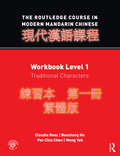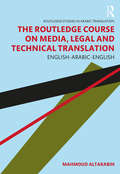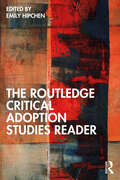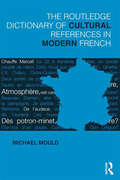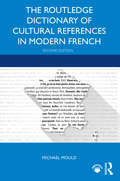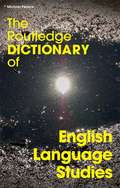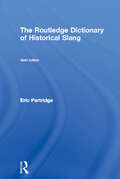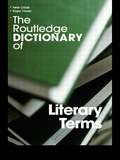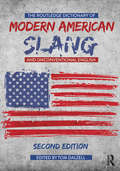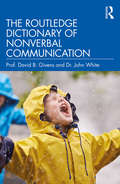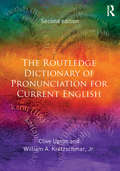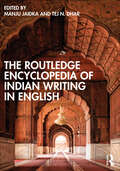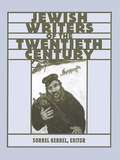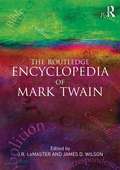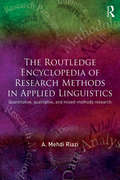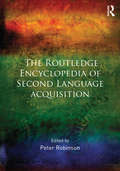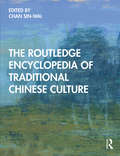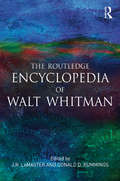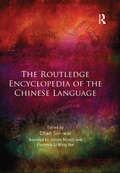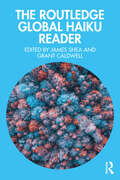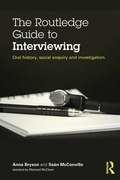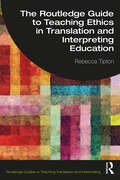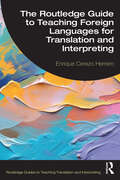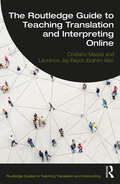- Table View
- List View
The Routledge Course in Modern Mandarin Chinese: Workbook Level 1, Traditional Characters
by Claudia Ross Baozhang He Pei-Chia Chen Meng YehThe Routledge Course in Modern Mandarin Chinese is a two-year undergraduate course for students with no prior background in Chinese study which takes students from complete beginner to post-intermediate level. Designed to build a strong foundation in both the spoken and written language it develops all the basic skills such as pronunciation, character writing, word use and structures, while placing strong emphasis on the development of communicative skills. Each level of the course consists of a textbook and workbook, available separately in simplified or traditional character editions. Both workbooks include a free CD with all the dialogues from the textbooks and the necessary audio for the listening for information exercises. A companion website will provide expanded listening files and a broad range of resources for students and teachers. The benefits of this course include: -focus on the long-term retention of vocabulary, characters and structures by reiterating structures and vocabulary throughout the book series -carefully selected and staged introduction of characters with staged removal of pinyin to ensure recognition and use of characters -clear and jargon-free explanations of use and structures, that are easy for students and teachers to understand -extensive workbook exercises for homework, independent study, and classroom use focusing on all language skills and modalities including a vast inventory of carefully structured exercises focusing on listening comprehension, reading for information, and writing for communication - an extensive inventory of classroom activities that guide students to develop communication-based speaking and listening skills. -a list of communication goals and key structures for each lesson allowing the student to assess progress -cultural notes explaining the context of the dialogues - language FAQs explaining aspects of Chinese language as they relate to the content and vocabulary in the lesson -storyline following a group of students studying in China from Europe, North America and East Asia, making the book attractive to a variety of students and facilitating the introduction of Chinese culture. -full-color text design for the textbook and carefully matched designs for the traditional and simplified books, allowing for easy cross-reference. The course is also fully supported by an interactive companion website. The website contains a wealth of additional resources for both teachers and students. Teachers will find lesson plans in both English and Mandarin, providing a weekly schedule and overall syllabus for fall and spring, as well as activities for each lesson and answer keys. Students will be able to access downloadable character practice worksheets along with interactive pronunciation, vocabulary and character practice exercises. All the audio material necessary for the course is also available onliine and conveniently linked on screen to the relevant exercises for ease-of-use. For further details please visit http://www.routledge.com/books/details/9780415472517/ For bundle discounts please visit http://www.routledge.com/books/details/9780415596862/
The Routledge Course on Media, Legal and Technical Translation: English-Arabic-English (Routledge Studies in Arabic Translation)
by Mahmoud AltarabinThe Routledge Course on Media, Legal and Technical Translation: English-Arabic-English is an indispensable and engaging coursebook for university students wishing to develop their English-Arabic-English translation skills in these three text types. Taking a practical approach, the book introduces Arab translation students to common translation strategies in addition to the linguistic, syntactic, and stylistic features of media, legal, and technical texts. This book features texts carefully selected for their technical relevance. The key features include: • comprehensive four chapters covering media, legal, and technical texts, which are of immense importance to Arab translation students; • detailed and clear explanations of the lexical, syntactic, and stylistic features of English and Arabic media, legal, and technical texts; • up-to-date and practical translation examples in both directions offering students actual experiences of professional translators; • authentic texts extracted from various sources to promote students’ familiarity with language features and use; • extensive range of exercises following each section of the book to enable students to test and practice the knowledge and skills they developed from reading previous sections; • glossaries following most exercises containing the translation of difficult words; and • a list of recommended readings following each chapter. The easy, practical, and comprehensive approach adopted in the book makes it a must-have coursebook for intermediate and advanced students studying translation between English and Arabic. University instructors and professional translators working on translation between English and Arabic will find this book particularly useful.
The Routledge Critical Adoption Studies Reader
by Emily HipchenThe Routledge Critical Adoption Studies Reader presents a central source of scholarly approaches arranged around fundamental questions about how adoption, as a complex practice of family-making, is represented in art, philosophy, the law, history, literature, political science, and other humanities. Divided into three major parts, this volume traces the history of adoption and its analogues, identifies major movements in the practice, and illuminates comprehensive disciplinary frameworks that underpin the field’s approaches. This key scholarly and pedagogical tool includes excerpts from scholars such as Judith Butler, Dorothy Roberts, Margaret Homans, Margaret D. Jacobs, Arissa Oh, Marianne Novy, and Kori Graves. It explores a variety of representations of adoption and embraces interdisciplinary discussions of reproduction as it intersects race, ethnicity, power relations, the concept of nation, history, the idea of childhood, and many other contemporary concerns. The Routledge Critical Adoption Studies Reader provides a single-volume resource for instructors or students who want a convenient collection of foundational materials for teaching or reference, and for researchers newly discovering the field. This volume’s humanities perspective makes it the first of its kind to collect secondary materials in Critical Adoption Studies for researchers, who, in taking up cultural representations of adoption, examine cultural contexts not for their impact on the practice over time but for their richness of engagement with the human experience of belonging, kinship, and identity.
The Routledge Dictionary of Cultural References in Modern French
by Michael MouldThe Routledge Dictionary of Cultural References in Modern French reveals the hidden cultural dimension of contemporary French, as used in the press, going beyond the limited and purely lexical approach of traditional bilingual dictionaries. Even foreign learners of French who possess a good level of French often have difficulty in fully understanding French articles, not because of any linguistic shortcomings on their part but because of their inadequate knowledge of the cultural references. This cultural dictionary of French provides the reader with clear and concise explanations of the crucial cultural dimension behind the most frequently used words and phrases found in the contemporary French press. This vital background information, gathered here in this innovative and entertaining dictionary, will allow readers to go beyond a superficial understanding of the French press and the French language in general, to see the hidden yet implied cultural significance that is so transparent to the native speaker. Key features: a broad range of cultural references from the historical and literary to the popular and classical, with an in-depth analysis of punning mechanisms. over 3,000 cultural references explained a three-level indicator of frequency over 600 questions to test knowledge before and after reading. The Routledge Dictionary of Cultural References in Modern French is the ideal reference for all undergraduate and postgraduate students of French seeking to enhance their understanding of the French language. It will also be of interest to teachers, translators and Francophiles alike. French students in khâgne, Sciences-Po and schools of journalism will also find this valuable and relevant for their studies.
The Routledge Dictionary of Cultural References in Modern French
by Michael MouldNow in its second edition, The Routledge Dictionary of Cultural References in Modern French reveals the hidden cultural dimension of contemporary French, as used in the press, going beyond the limited and purely lexical approach of traditional bilingual dictionaries. Even foreign learners of French who possess a good level of French often have difficulty in fully understanding French articles, not because of any linguistic shortcomings on their part but because of their inadequate knowledge of the cultural references. This cultural dictionary of French provides the reader with clear and concise explanations of the crucial cultural dimension behind the most frequently used words and phrases found in the contemporary French press. This vital background information, gathered here in this innovative and entertaining dictionary, will allow readers to go beyond a superficial understanding of the French press and the French language in general to see the hidden yet implied cultural significance that is so transparent to the native speaker. This fully revised second edition includes: a broad range of cultural references from the historical and literary to the popular and classical; an enhanced analysis of punning mechanisms used in the press; over 3,000 cultural references explained with updated examples; a three-level indicator of frequency; new and expanded chapters on the French of Quebec, institutional and academic references, and English borrowings in the areas of IT and medical science; over 600 online questions to test knowledge before and after reading. The Routledge Dictionary of Cultural References in Modern French is the ideal reference for all undergraduate and postgraduate students of French seeking to enhance their understanding of the French language. It will also be of interest to teachers, translators and Francophiles alike. French students in khâgne, Sciences-Po and schools of journalism will also find this book valuable and relevant for their studies. Test questions and solutions are available at www.routledge.com/9780367376758, in addition to three online chapters. These bonus chapters explore figurative expressions involving the names of animals, the language of the law and slang terms.
The Routledge Dictionary of English Language Studies (Routledge Dictionaries)
by Michael PearceFilled with real examples of the way people use English in different contexts, The Routledge Dictionary of English Language Studies is an indispensable guide to the richness and variety of the English language for both students and the general reader. From abbreviation to zero-article, via fricative and slang, the Dictionary contains over 600 wide ranging and informative entries covering: the core areas of language description and analysis: phonetics and phonology, grammar, lexis, semantics, pragmatics and discourse sociolinguistics, including entries on social and regional variation, stylistic variation, and language and gender the history of the English language from Old English to the present-day the main varieties of English spoken around the world, covering the British isles, the Caribbean, North America, Africa, Asia, and Australasia stylistics, literary language and English usage.
The Routledge Dictionary of Historical Slang
by Eric PartridgeDrawn from the Dictionary of Slang and Unconventional English, with the emphasis on the expressions used or coined before 1914.
The Routledge Dictionary of Literary Terms (Routledge Dictionaries)
by Roger Fowler Peter ChildsA twenty-first century version of Roger Fowler’s 1973 Dictionary of Modern Critical Terms, this latest edition of The Routledge Dictionary of Literary Terms is the most up-to-date guide to critical and theoretical concepts available to students of literature at all levels. With over forty newly commissioned entries, this essential reference book includes: an exhaustive range of entries, covering such topics as genre, form, cultural theory and literary technique new definitions of contemporary critical issues such as Cybercriticism and Globalization complete coverage of traditional and radical approaches to the study and production of literature thorough accounts of critical terminology and analyses of key academic debates full cross-referencing throughout and suggestions for further reading. Covering both long-established terminology as well as the specialist vocabulary of modern theoretical schools, The Routledge Dictionary of Literary Terms is an indispensable guide to the principal terms and concepts encountered in debates over literary studies in the twenty-first century.
The Routledge Dictionary of Modern American Slang and Unconventional English
by Tom DalzellThe Routledge Dictionary of Modern American Slang offers the ultimate record of modern, post WW2 American Slang. The 25,000 entries are accompanied by citations that authenticate the words as well as offer examples of usage from popular literature, newspapers, magazines, movies, television shows, musical lyrics, and Internet user groups. Etymology, cultural context, country of origin and the date the word was first used are also provided. In terms of content, the cultural transformations since 1945 are astounding. Television, computers, drugs, music, unpopular wars, youth movements, changing racial sensitivities and attitudes towards sex and sexuality are all substantial factors that have shaped culture and language. This new edition includes over 500 new headwords collected with citations from the last five years, a period of immense change in the English language, as well as revised existing entries with new dating and citations. No term is excluded on the grounds that it might be considered offensive as a racial, ethnic, religious, sexual or any kind of slur. This dictionary contains many entries and citations that will, and should, offend. Rich, scholarly and informative, The Routledge Dictionary of Modern American Slang and Unconventional English is an indispensable resource for language researchers, lexicographers and translators.
The Routledge Dictionary of Nonverbal Communication
by John White David B. GivensEvery day, the human awakes to a new world, a new dawn and a new cascade of nonverbal communication. It may be the pleasant scent of a rose, the soft touch of a loved one, the sight of sun rays on a bedroom floor or the excited chatter of a child. Whatever form it takes, your environment and all who inhabit it send nonverbal signals all day long – even while they sleep. The Routledge Dictionary of Nonverbal Communication celebrates this communication, examining a very wide selection of nonverbal behaviors, actions and signals to provide the reader with an informed insight on the world around them and its messages. Compiled in the form of a dictionary, the book is presented as a series of chapters with alphabetical entries, ranging from attractiveness to zeitgeist. The book aims to provide the reader with a clear understanding of some of the relevant discourse on particular topics while also making it practical and easy to read. It draws on a wide selection of discourse from fields such as neuroscience, psychology, anthropology and psychiatry. The dictionary will be an essential companion for anyone wishing to understand nonverbal communication. It will also be especially useful for those working in the field of nonverbal communication.
The Routledge Dictionary of Pronunciation for Current English
by Clive Upton William A. Kretzschmar, Jr.The Routledge Dictionary of Pronunciation for Current English is the most up-to-date record of the pronunciation of British and American English. Based on research by a joint UK and US team of linguistics experts, this is a unique survey of how English is really spoken in the twenty-first century. This second edition has been fully revised to include: a full reappraisal of the pronunciation models for modern British and American English; 2,000 new entries, including new words from the last decade, encyclopedic terms and proper names; separate IPA transcriptions for British and American English for over 100,000 words; information on grammatical variants including plurals, comparative and superlative adjectives, and verb tenses. The most comprehensive dictionary of its type available, The Routledge Dictionary of Pronunciation for Current English is the essential reference for those interested in English pronunciation.
The Routledge Encyclopedia of Indian Writing in English
by Manju Jaidka Tej N. DharToday, Indian writing in English is a fi eld of study that cannot be overlooked. Whereas at the turn of the 20th century, writers from India who chose to write in English were either unheeded or underrated, with time the literary world has been forced to recognize and accept their contribution to the corpus of world literatures in English. Showcasing the burgeoning field of Indian English writing, this encyclopedia documents the poets, novelists, essayists, and dramatists of Indian origin since the pre-independence era and their dedicated works. Written by internationally recognized scholars, this comprehensive reference book explores the history and development of Indian writers, their major contributions, and the critical reception accorded to them. The Routledge Encyclopedia of Indian Writing in English will be a valuable resource to students, teachers, and academics navigating the vast area of contemporary world literature.
The Routledge Encyclopedia of Indian Writing in English
by Manju Jaidka Tej N. DharToday, Indian writing in English is a fi eld of study that cannot be overlooked. Whereas at the turn of the 20th century, writers from India who chose to write in English were either unheeded or underrated, with time the literary world has been forced to recognize and accept their contribution to the corpus of world literatures in English. Showcasing the burgeoning field of Indian English writing, this encyclopedia documents the poets, novelists, essayists, and dramatists of Indian origin since the pre-independence era and their dedicated works. Written by internationally recognized scholars, this comprehensive reference book explores the history and development of Indian writers, their major contributions, and the critical reception accorded to them. The Routledge Encyclopedia of Indian Writing in English will be a valuable resource to students, teachers, and academics navigating the vast area of contemporary world literature.
The Routledge Encyclopedia of Jewish Writers of the Twentieth Century
by Sorrel KerbelNow available in paperback for the first time, Jewish Writers of the Twentieth Century is both a comprehensive reference resource and a springboard for further study. This volume: examines canonical Jewish writers, less well-known authors of Yiddish and Hebrew, and emerging Israeli writers includes entries on figures as diverse as Marcel Proust, Franz Kafka, Tristan Tzara, Eugene Ionesco, Harold Pinter, Tom Stoppard, Arthur Miller, Saul Bellow, Nadine Gordimer, and Woody Allen contains introductory essays on Jewish-American writing, Holocaust literature and memoirs, Yiddish writing, and Anglo-Jewish literature provides a chronology of twentieth-century Jewish writers. Compiled by expert contributors, this book contains over 330 entries on individual authors, each consisting of a biography, a list of selected publications, a scholarly essay on their work and suggestions for further reading.
The Routledge Encyclopedia of Mark Twain
by J. R. LeMaster James D. Wilson Christie Graves Hamric"A model reference work that can be used with profit and delight by general readers as well as by more advanced students of Twain. Highly recommended." - Library Journal The Routledge Encyclopedia of Mark Twain includes more than 700 alphabetically arranged entries that cover a full variety of topics on this major American writer's life, intellectual milieu, literary career, and achievements. Because so much of Twain's travel narratives, essays, letters, sketches, autobiography, journalism and fiction reflect his personal experience, particular attention is given to the delicate relationship between art and life, between artistic interpretations and their factual source. This comprehensive resource includes information on: Twain’s life and times: the author's childhood in Missouri and apprenticeship as a riverboat pilot, early career as a journalist in the West, world travels, friendships with well-known figures, reading and education, family life and career Complete Works: including novels, travel narratives, short stories, sketches, burlesques, and essays Significant characters, places, and landmarks Recurring concerns, themes or concepts: such as humor, language; race, war, religion, politics, imperialism, art and science Twain’s sources and influences. Useful for students, researchers, librarians and teachers, this volume features a chronology, a special appendix section tracking the poet's genealogy, and a thorough index. Each entry also includes a bibliography for further study.
The Routledge Encyclopedia of Research Methods in Applied Linguistics
by A. Mehdi RiaziThe Routledge Encyclopedia of Research Methods in Applied Linguistics provides accessible and concise explanations of key concepts and terms related to research methods in applied linguistics. Encompassing the three research paradigms of quantitative, qualitative, and mixed methods, this volume is an essential reference for any student or researcher working in this area. This volume provides: A–Z coverage of 570 key methodological terms from all areas of applied linguistics; detailed analysis of each entry that includes an explanation of the head word, visual illustrations, cross-references to other terms, and further references for readers; an index of core concepts for quick reference. Comprehensively covering research method terminology used across all strands of applied linguistics, this encyclopedia is a must-have reference for the applied linguistics community.
The Routledge Encyclopedia of Second Language Acquisition
by Peter RobinsonThe Routledge Encyclopedia of Second Language Acquisition offers a user-friendly, authoritative survey of terms and constructs that are important to understanding research in second language acquisition (SLA) and its applications. The Encyclopedia is designed for use as a reference tool by students, researchers, teachers and professionals with an interest in SLA. The Encyclopedia has the following features: • 252 alphabetized entries written in an accessible style, including cross references to other related entries in the Encyclopedia and suggestions for further reading • Among these, 9 survey entries that cover the foundational areas of SLA in detail: Development in SLA, Discourse and Pragmatics in SLA, Individual Differences in SLA, Instructed SLA, Language and the Lexicon in SLA, Measuring and Researching SLA, Psycholingustics of SLA, Social and Sociocultural Approaches to SLA, Theoretical Constructs in SLA. • The rest of the entries cover all the major subdisciplines, methodologies and concepts of SLA, from “Accommodation” to the “ZISA project.” Written by an international team of specialists, the Routledge Encyclopedia of Second Language Acquisition is an invaluable resource for students and researchers with an academic interest in SLA.
The Routledge Encyclopedia of Traditional Chinese Culture
by Chan Sin-WaiThe Routledge Encyclopedia of Traditional Chinese Culture offers an in-depth discussion of cultural aspects of China from the ancient period to the pre-modern era, lasting over 5,000 years, comprised of 7,000 word pieces by more than 20 world-leading academics and experts. Addressing areas such as China studies, cultural studies, cultural management, and more specific areas – such as religion, opera, Chinese painting, Chinese calligraphy, material culture, performing arts, and visual arts – this encyclopedia covers all major aspects of traditional Chinese culture. The volume is intended to be a detailed reference for graduate students on a variety of courses, and also for undergraduate students on survey courses to Chinese culture.
The Routledge Encyclopedia of Walt Whitman (Blackwell Companions To Literature And Culture Ser.)
by Donald D. Kummings J. R. LeMasterThe Routledge Encyclopedia of Walt Whitman presents a comprehensive resource complied by over 200 internationally recognized contributors, including such leading Whitman scholars as James E. Miller, Jr., Roger Asselineau, Betsy Erkkila, and Joel Myerson. Now available for the first time in paperback, this volume comprises more than 750 entries arranged in convenient alphabetical format. Coverage includes: biographical information: all names, dates, places, and events important to understanding Whitman's life and careerWhitman's works: essays on all eight editions of Leaves of Grass, major poems and poem clusters, principal essays and prose works, as well as his more than two dozen short stories and the novel, Franklin Evansprominent themes and concepts: essays on such major topics as democracy, slavery, the Civil War, immortality, sexuality, and the women's rights movement.significant forms and techniques: such as prosody, symbolism, free verse, and humourimportant trends and critical approaches in Whitman studies: including new historicist and cultural criticism, psychological explorations, and controversial issues of sexual identitysurveys of Whitman's international impact as well as an assessment of his literary legacy. Useful for students, researchers, librarians, teachers, and Whitman devotees, this volume features extensive cross-references, numerous photographs of the poet, a chronology, a special appendix section tracking the poet's genealogy, and a thorough index. Each entry includes a bibliography for further study.
The Routledge Encyclopedia of the Chinese Language
by Sin-Wai ChanThe Routledge Encyclopedia of the Chinese Language is an invaluable resource for language learners and linguists of Chinese worldwide, those interested readers of Chinese literature and cultures, and scholars in Chinese studies. Featuring the research on the changing landscape of the Chinese language by a number of eminent academics in the field, this volume will meet the academic, linguistic and pedagogical needs of anyone interested in the Chinese language: from Sinologists to Chinese linguists, as well as teachers and learners of Chinese as a second language. The encyclopedia explores a range of topics: from research on oracle bone and bronze inscriptions, to Chinese language acquisition, to the language of the mass media. This reference offers a guide to shifts over time in thinking about the Chinese language as well as providing an overview of contemporary themes, debates and research interests. The editors and contributors are assisted by an editorial board comprised of the best and most experienced sinologists world-wide. The reference includes an introduction, written by the editor, which places the assembled texts in their historical and intellectual context. The Encyclopedia of the Chinese Language is destined to be valued by scholars and students as a vital research resource.
The Routledge Global Haiku Reader
by James Shea Grant CaldwellThe Routledge Global Haiku Reader provides a historical overview and comprehensive examination of haiku across the world in numerous languages, poetic movements, and cultural contexts. Offering an extensive critical perspective, this volume provides leading essays by poets and scholars who explore haiku’s various global developments, demonstrating the form’s complex and sometimes contradictory manifestations from the twentieth century to the present. The sixteen chapters are carefully organized into categories that reflect the salient areas of practice and study: Haiku in Transit, Haiku and Social Consciousness, Haiku and Experimentation, and The Future of Global Haiku. An insightful introduction surveys haiku’s influence beyond Japan and frames the collection historically and culturally, questioning commonly held assumptions about haiku and laying the groundwork for new ways of seeing the form. Haiku’s elusiveness, its resistance to definition, is partly what keeps it so relevant today, and this book traces the many ways in which this global verse form has evolved. The Routledge Global Haiku Reader ushers haiku into the twenty-first century in a critically minded and historically informed manner for a new generation of readers and writers and will appeal to students and researchers in Asian studies, literary studies, comparative literature, creative writing, and cultural studies
The Routledge Guide to Interviewing: Oral History, Social Enquiry and Investigation
by Sean McConville Anna BrysonThe Routledge Guide to Interviewing sets out a well-tested and practical approach and methodology: what works, difficulties and dangers to avoid and key questions which must be answered before you set out. Background methodological issues and arguments are considered and drawn upon but the focus is on what is ethical, legally acceptable and productive: Rationale (why, what for, where, how) Ethics and Legalities (informed consent, data protection, risks, embargoes) Resources (organisational, technical, intellectual) Preparation (selecting and approaching interviewees, background and biographical research, establishing credentials, identifying topics) Technique (developing expertise and confidence) Audio-visual interviews Analysis (modes, methods, difficulties) Storage (archiving and long-term preservation) Sharing Resources (dissemination and development) From death row to the mansion of a head of state, small kitchens and front parlours, to legislatures and presbyteries, Anna Bryson and Seán McConville’s wide interviewing experience has been condensed into this book. The material set out here has been acquired by trial, error and reflection over a period of more than four decades. The interviewees have ranged from the delightfully straightforward to the painfully difficult to the near impossible – with a sprinkling of those that were impossible. Successful interviewing draws on the survival skills of everyday life. This guide will help you to adapt, develop and apply these innate skills. Including a range of useful information such as sample waivers, internet resources, useful hints and checklists, it provides sound and plain-speaking support for the oral historian, social scientist and investigator.
The Routledge Guide to Teaching Ethics in Translation and Interpreting Education (Routledge Guides to Teaching Translation and Interpreting)
by Rebecca TiptonRoutledge Guides to Teaching Translation and Interpreting is a series of practical guides to key areas of translation and interpreting for instructors, lecturers, and course designers. This book provides university-level educators in translation and interpreting with a practical set of resources to support a pedagogically engaged approach to ethics. Encompassing critical engagement and reflection, the resources have been designed to be easily developed and adapted to specific teaching contexts. The book promotes an integrated approach to ethics teaching. Its core goals are to improve the quality of student learning about ethics, develop confidence in ethical decision-making, and enhance a commitment to ethics beyond the programme of study. The approach includes emphasis on problems of practice, or “ethical dilemmas”, using real-world examples, but simultaneously encompasses a more wide-ranging set of ethical questions for both educators and their students. Including chapters on the ethical implications of using technology and the ethics involved in assessment and feedback, equal weight is given to both translation and interpreting. Providing a key point of reference for information on different theories of ethics, insight into pedagogical practices around the globe, and practical guidance on resource development for classroom use and extension activities for independent learning, this is an essential text for all instructors and lecturers teaching ethics in translation and interpreting studies.
The Routledge Guide to Teaching Foreign Languages for Translation and Interpreting (Routledge Guides to Teaching Translation and Interpreting)
by Enrique Cerezo HerreroThe Routledge Guide to Teaching Foreign Languages for Translation and Interpreting is an essential resource for lecturers and course designers looking to develop a foreign language module within a translation and interpreting program. It is also valuable for students and practicing translators and interpreters who wish to expand their linguistic repertoire by adding an additional language.This practical guide initiates a dialogue between translation studies and foreign language teaching, highlighting the distinctive nature of this training compared to other foreign language teaching contexts. It explores key pedagogical aspects that enable language lecturers and course designers to align their teaching practices with the specific training needs of students in translation and interpreting programs.With a clear, practical approach, this volume aims to bridge the gap between theory and practice, addressing the lack of research and ready-made materials that can support lecturers in their teaching endeavors. It integrates the theoretical foundations of TILLT (Translation and Interpreting-oriented Language Learning and Teaching) with practical teaching guidelines and resources designed to help language lecturers connect their instruction to the development of translation competence.
The Routledge Guide to Teaching Translation and Interpreting Online (Routledge Guides to Teaching Translation and Interpreting)
by Cristiano Mazzei Laurence Jay-Rayon Ibrahim AiboRoutledge Guides to Teaching Translation and Interpreting is a series of practical guides to key areas of translation and interpreting for instructors, lecturers, and course designers. The Routledge Guide to Teaching Translation and Interpreting Online is for educators of translation and interpreting teaching online in a variety of curricular combinations: fully online, partially online, hybrid, multimodal, or face-to-face with online components. Offering suggestions for the development of curriculum and course design in addition to online tools that can be used in skill-building activities, and adaptable to specific instructional needs, this textbook is suitable for both multilingual and language-specific classes. Fully comprehensive, the book addresses the tenets and importance of process-oriented pedagogy for students of translation and interpreting, best practices in online curriculum and course design, instructor online presence, detailed illustrations of specific online assignments, the importance of regular and timely feedback, and teaching across the online translation and interpreting (T&I) curriculum. Written by two experienced translators, interpreters, and scholars who have been teaching online for many years and in various settings, this book is an essential guide for all instructors of translation and interpreting as professional activities and academic disciplines.
